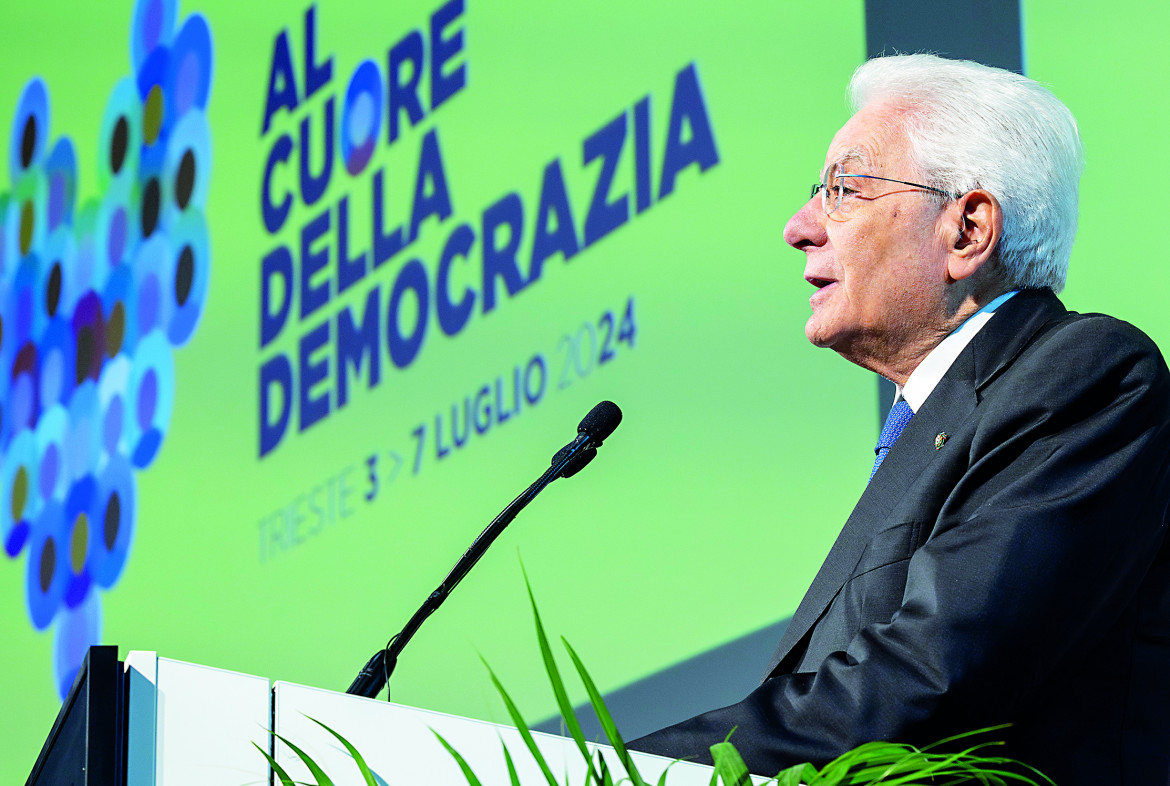Analysis
Mattarella speech is a masterclass on democracy: ‘No to authority without limits’
President of the Republic: The institutions only function if ‘there is a perception of a way of being together and of a common good.’

“One cannot resort to systemic simplifications or restrictions on rights ‘in the name of the duty to govern,’” said President Sergio Mattarella in his speech at the Catholic Social Week in Trieste. “A democracy ‘of the majority’ would be a hopeless contradiction.”
In his lengthy speech, in which he quoted Norberto Bobbio several times, he gave a masterclass on democracy and the Constitution addressed to anyone who is considering reducing the exercise of democracy to voting for one leader, and to those who believe that winning the popular vote can be seen as a free pass to absolute power.
“Democracy as a form of government is not sufficient to fully guarantee the protection of rights and liberties: it can be distorted and twisted under the pretext of higher goods or common benefits. This is something that the 20th century reminds and warns us about.”
Hence his warning about the need to not confuse the “general will” with that of a majority that is abusively touted “as representing the will of the whole people.” Such an interpretation can prove “more unjust and more oppressive than the will of a prince,” as it has in the past, Mattarella stressed, quoting the jurist Emilio Tosato, who challenged an assumption originating from Rousseau in his speech at the Catholics' Week in 1945. Thus, he advocated for “a firm ‘no’ to state absolutism, to an authority without limits, potentially abusive.”
“Awareness of limits is an indispensable factor for the true and indispensable vitality of democracy.” We need “limits on the majority’s decisions, which cannot infringe on the rights of minorities.”
The President did not explicitly address the constitutional reforms under consideration by Parliament, such as the direct election of the premier – which Meloni is pushing hard for – or the possibility of electoral reform in an even more majoritarian direction, floated on Wednesday by Minister Casellati. But he warned about the risks inherent in attempts to exploit the expression of the popular vote: for example, when “the ‘one man, one vote’ principle is distorted through contrivances that alter the representativeness and will of the voters.” One must also be wary of thinking that the exercise of democracy takes place “only by the indispensable expression of one's suffrage at the ballot box.” At the heart of democracy, the president recalled, “are the people, the relationships and the communities to which they give life.”
Furthermore, the institutions only function if “there is a perception of a way of being together and of a common good,” if “there is no succumbing to the obsessive proclamation of being against something else, of revenge, of delegitimization,” and if “the universality of rights is not undermined by conditions of social imbalance,” if “solidarity remains the connective tissue of a sustainable economy, if participation is alive and widespread.” It’s hard to recreate such conditions in today's Italy and Europe. This is why “we are experiencing all the difficulty, and sometimes even a certain weariness in the functioning of democracies,” which, alongside age-old problems, are facing “unprecedented critical issues.” “Democracy is never won forever,” Mattarella warned, recalling the risks of “technocratic solutions” and also, quoting Tocqueville, the possibility that “soulless democracies” may end up imploding.
The president recalled the great significance of the fact that at the Constituent Assembly, Giuseppe Dossetti raised the issue of “the true access of the people, and of all the people, to power, and to all power – not only political power, but also economic and social power.“ This ambitious goal of “substantive democracy” seems to be further than ever from being realized. Regardless, Mattarella is unwilling to resign himself to this state of affairs, reiterating that “conscious participation finds its origin in the fulfillment of the supreme principle, equality” – an indispensable step for a much-needed “democratic literacy.”
The first part of the Constitution, according to Mattarella, already contains all the essential principles from which one can draw inspiration for a full and participatory democracy. Thus, it would be “wrong and risky to give in to contingent sensitivities” and “insert references to particular topics” in the first part of the Constitution, “ignoring the fact that the latter includes them in any case, based on its fundamental principles and values.”
The President also returned to a topic that was the object of a heated exchange between him and the Lega on June 2: European sovereignty. “While in the past democracy was realized in the states, today there is a need to build a solid European sovereignty that would complement and give concrete, not illusory, substance to that of the member states”: a way to strengthen “the sovereignty of the people as designed by our Constitutions.”
Originally published at https://ilmanifesto.it/riforme-laltola-di-mattarella-no-al-potere-senza-limiti on 2024-07-04
